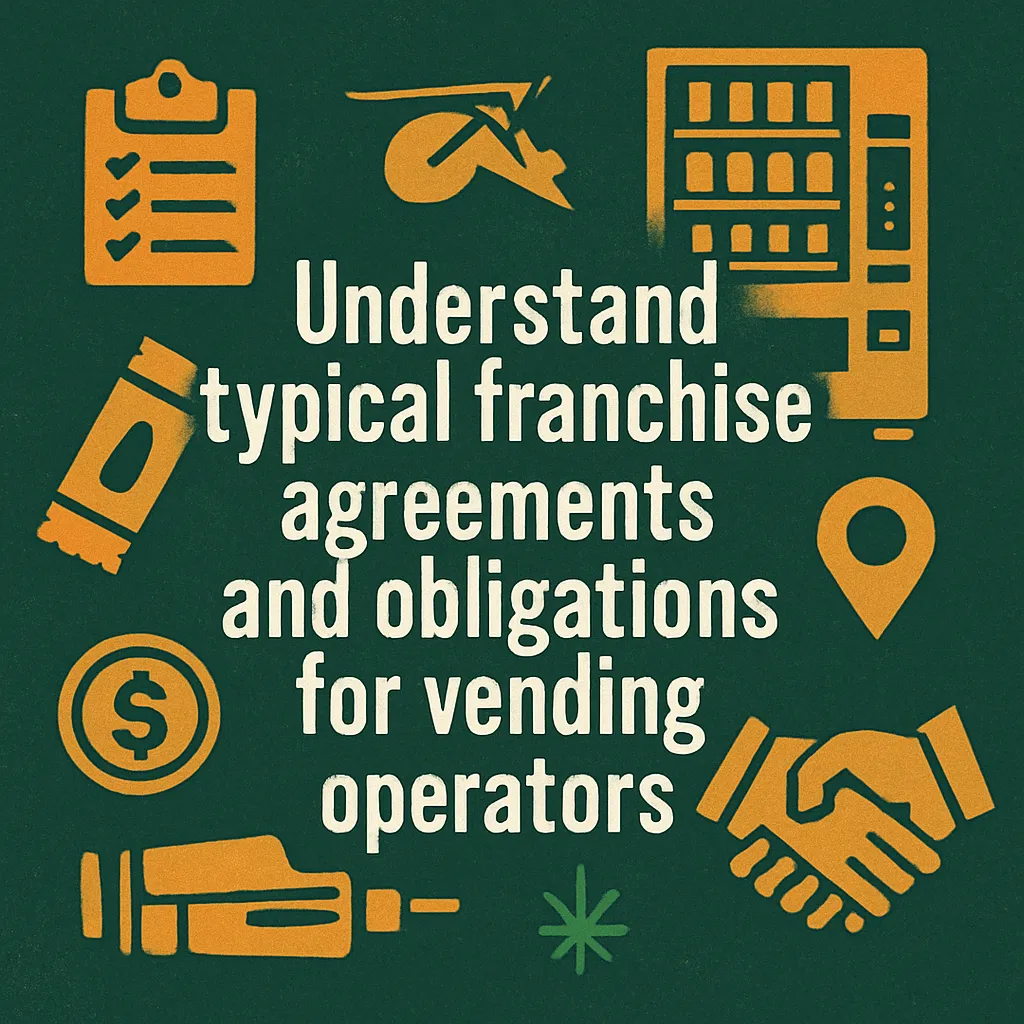Vending Franchise Contracts Explained
Understand typical franchise agreements and obligations for vending operators.
Back to Vending Franchises ResourcesUnderstand typical franchise agreements and obligations for vending operators.
Back to Vending Franchises ResourcesStart your 30-day free trial and get instant SMS and email alerts whenever a local business needs vending service. These are real location leads to help you grow your route — you decide which ones to buy, no obligations or contracts.
![]() Comprehensive terms covering fees, operations, and support
Comprehensive terms covering fees, operations, and support
![]() Defines mutual obligations between franchisor and franchisee
Defines mutual obligations between franchisor and franchisee
![]() Establishes the foundation for long-term business relationship
Establishes the foundation for long-term business relationship
30 days free, then $39 / month.
No Commitment. Cancel Anytime.

Embarking on a vending franchise journey requires a solid understanding of the binding legal agreement that underpins the entire operation: the vending franchise contract. This crucial document, often detailed and lengthy, spells out the relationship between the franchisor (the brand owner) and you, the franchisee (the independent business owner operating under that brand). It's more than just a piece of paper; it's the blueprint for your business, detailing everything from initial fees to daily operational parameters and eventual exit strategies.
Every vending franchise contract will feature several key clauses that demand your close attention. These typically include the initial franchise fee, which grants you the right to use the franchisor’s brand and system. Beyond this, you'll encounter ongoing royalty fees, usually a percentage of your gross sales, paid for continuous support and brand access. It's vital to dissect these financial obligations to understand their impact on your profitability. Potential franchisees should also be aware of clauses related to questions to ask before signing a vending contract to ensure all terms are clear.
A significant portion of the contract will detail operational guidelines. This includes everything from approved vending machine types and product sourcing to branding standards and customer service expectations. The franchisor provides these guidelines to maintain consistency across all franchise locations, which benefits the overall brand. In return, the contract will also outline the support you can expect, such as initial training, ongoing technical assistance, marketing materials, and access to a supplier network. Understanding the scope of this support is critical, as it directly impacts your ability to run the business effectively. For information on when to consider a management company to help with these operations, read more about what is a vending management company.
Other essential aspects covered in a vending franchise contract are territory rights—whether you have exclusive rights to operate within a certain geographical area, or if the franchisor retains rights to place other vending solutions or franchised units nearby. The contract term, including renewal options, is another critical element, setting the duration of your agreement and outlining conditions for extension. Finally, pay close attention to termination clauses, which specify the conditions under which either party can end the agreement, and the potential consequences, including any buy-back options or penalties. Neglecting to understand these can lead to significant financial or operational challenges. It’s always wise to learn about early termination of vending contracts before committing. Always consult with a legal professional experienced in franchise law before signing to ensure your investment is protected and that you fully comprehend your long-term commitments.
Vending Exchange connects vending operators with real businesses actively looking for vending services—including traditional machines, AI coolers, and office coffee. Get instant SMS and email alerts when new opportunities are available in your area. No contracts or monthly fees—just buy the leads you want. Start your free 30-day trial today and grow your vending business on your terms.
A vending franchise contract is a legally binding agreement between a franchisor (the brand owner) and a franchisee (the operator) that outlines the terms for operating a vending business under the franchisor's brand, system, and support.
Key elements typically include the franchise fee, royalty fees, operating guidelines, territory rights, initial training, ongoing support, marketing contributions, and renewal or termination clauses.
Careful review is crucial to understand all financial obligations, operational requirements, renewal terms, and potential liabilities, ensuring the agreement aligns with your business goals and expectations.
Royalty fees are ongoing payments made by the franchisee to the franchisor, typically a percentage of gross sales, in exchange for continued use of the brand, system, and support.
Some vending franchise contracts grant franchisees an exclusive territory, protecting them from other franchisees of the same brand operating within a defined geographical area. This varies by franchisor.
Franchisors often provide initial training, ongoing operational support, marketing assistance, access to preferred suppliers, and sometimes help with location scouting and machine procurement.
Early termination clauses vary greatly. There may be penalties, loss of initial fees, requirements to sell the business to an approved buyer, or other specific conditions outlined in the agreement.
Most franchise contracts include renewal options, allowing franchisees to extend their agreement for additional terms, often with updated terms and conditions or a renewal fee.
Advantages include brand recognition, established operating systems, group purchasing power, initial training, and ongoing support, which can reduce startup risks for new business owners.
Absolutely. It's highly recommended to consult with an attorney specializing in franchise law to fully understand the terms and implications before signing any franchise agreement.